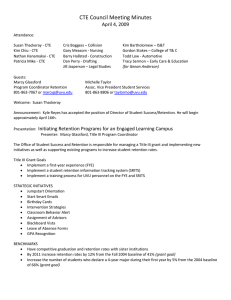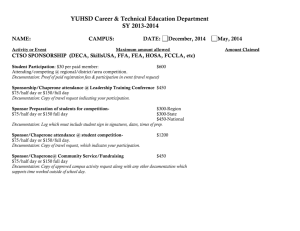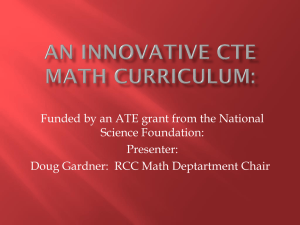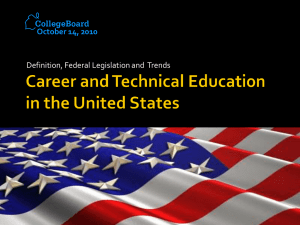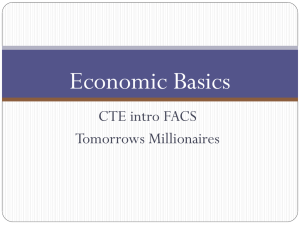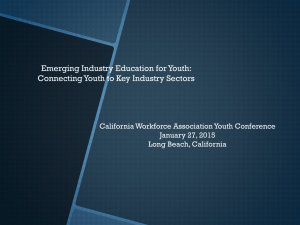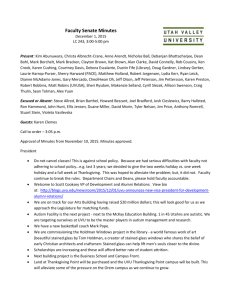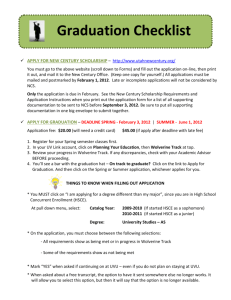I. Career and Technical Education at UVU
advertisement
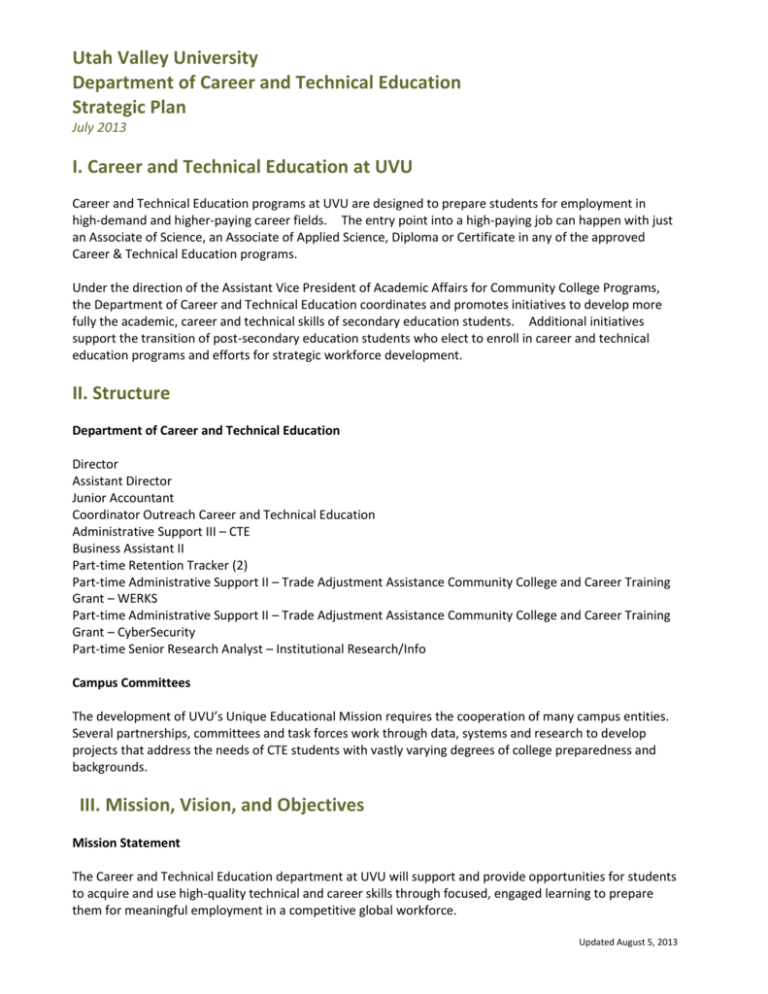
Utah Valley University Department of Career and Technical Education Strategic Plan July 2013 I. Career and Technical Education at UVU Career and Technical Education programs at UVU are designed to prepare students for employment in high-demand and higher-paying career fields. The entry point into a high-paying job can happen with just an Associate of Science, an Associate of Applied Science, Diploma or Certificate in any of the approved Career & Technical Education programs. Under the direction of the Assistant Vice President of Academic Affairs for Community College Programs, the Department of Career and Technical Education coordinates and promotes initiatives to develop more fully the academic, career and technical skills of secondary education students. Additional initiatives support the transition of post-secondary education students who elect to enroll in career and technical education programs and efforts for strategic workforce development. II. Structure Department of Career and Technical Education Director Assistant Director Junior Accountant Coordinator Outreach Career and Technical Education Administrative Support III – CTE Business Assistant II Part-time Retention Tracker (2) Part-time Administrative Support II – Trade Adjustment Assistance Community College and Career Training Grant – WERKS Part-time Administrative Support II – Trade Adjustment Assistance Community College and Career Training Grant – CyberSecurity Part-time Senior Research Analyst – Institutional Research/Info Campus Committees The development of UVU’s Unique Educational Mission requires the cooperation of many campus entities. Several partnerships, committees and task forces work through data, systems and research to develop projects that address the needs of CTE students with vastly varying degrees of college preparedness and backgrounds. III. Mission, Vision, and Objectives Mission Statement The Career and Technical Education department at UVU will support and provide opportunities for students to acquire and use high-quality technical and career skills through focused, engaged learning to prepare them for meaningful employment in a competitive global workforce. Updated August 5, 2013 Vision The vision of the Career and Technical Education Department has three components. The first is to provide students with the resources and programs necessary to complete a degree relevant to the regional workforce demands. UVU’s CTE will provide opportunities and support for students at all levels of college preparation and skill sets. Career and technical education classes and programs are offered regardless of race, color, national origin, sex, age, or disability. Second, CTE will administer a transparent process to distribute resources to support faculty and students in multiple approved programs of study. Accountability standards include the necessary internal controls to track inventory, budgets and data to demonstrate successful strategies for both program improvement and economic development. Third, CTE will provide campus and community wide informational outreach efforts of CTE inclusive engagement. The goal is to create awareness and understanding of the unique educational mission delivered through Utah Valley University. Objectives Objective 1: Increase completion of certificate or degree to assist the 2020 goal. Core Value Link: Student Success SS.1, SS.3, Serious S.3 Justification: FAUPL mandate. Persistence through graduation is the core of our mission. Assessment Plan: Graduation rates as calculated by Institutional Research. Objective 2: Increase transparency and inventory control of federally funded purchases. Core Value Link: Student Success SS.1, SS.2, Serious S.3, S.4, Engaged E.1 Justification: EDGAR federal guidelines require established reporting standards of accurate, current, and complete disclosure of the financial results of each federally sponsored project. Assessment Plan: Using random selection, evaluate and reconcile 15% of the approved CTE programs of study for federal compliance standards Objective 3: Promote faculty and advisor success through strategic completion and visibility initiatives. Core Value Link: Student Success SS.1, SS.2, Inclusive I.2, Engaged E.2, Serious S.4 Justification: Well-planned completion and visibility initiatives will create an environment to promote and build an industry-recognized reputation of excellence. Assessment Plan: CTE success is evaluated by skill assessments that are aligned with recognized industry standards or state licensure. Objective 4: Provide equipment and training for campus personnel to promote student success. Core Value Link: Student Success SS.1, Inclusive I.1, I.2, Engaged E.1, E.2, E.3, Serious S.1, S.3 Justification: An effective training and professional development program, enhanced with industry relevant equipment and resources, strengthens the institution’s ability to support students and promote their success. Assessment Plan: Student success and retention training and tools are evaluated by retention and graduation rates. Additional assessment includes surveys of faculty, advisors, and students. Updated August 5, 2013 Objective 5: Adhere to all Department of Labor TAACCCT grant deliverables, reports and standards. Justification: EDGAR and DOL federal guidelines require established reporting standards of accurate, current and complete disclosure of the financial results of each federally sponsored project. Assessment Plan: Quarterly and annual reports, as well as any audits conducted by the Department of Labor IV. Strategic Goals A. Training and Informational Outreach • Campus partnerships that share (philosophy, best practices, curriculum, pedagogy) • Advisors Conference, Turning Point, Multicultural Department, Regional Directors • Informational outreach seminars, newsletters, employee events/meetings, direct/email, website • Formalize, package, informational outreach, promote, expand awareness B. Data and Assessment • Collection (grant participants, surveys, focus groups, Banner, Hobson’s) • Retention/Graduation • Surveys, focus groups, administrative reports • Assessment C. Committee Support • Provide meaningful direction and follow through • Formalize Documentation • Assessment and retention campus plan • Communication Plans (faculty/staff, students) • Informational Outreach D. Promote the Unique Educational Mission • Identify workforce needs • Expand programs to meet regional workforce • Maintain and improve program viability to meet industry standards • Champion faculty professional development to encourage relevant curriculum • Research and expand opportunities for increased resources E. Accountability • Transparency in records and reporting • Inventory controls • Internal controls V. Challenges and Strengths Challenges • Federal and state decisions of formula allocation • Data and Assessment accuracy • Faculty/Advisor participation in completion and visibility strategies • Students not completing a certificate or degree • Banner online application Updated August 5, 2013 Strengths • Supportive administration • Highly dedicated staff committed to student success and retention • Strong, positive reputation of qualified programs of study • Demonstrated high standards of accountability • Collaborative spirit and reputation necessary for campus-wide participation Evidence Superior Performance Audit Ready Demonstrated programs of strategic impact Increased graduation Distinctive impact Recognized as a leader in grant management Recognized student accomplishments Supply prepared graduates to meet regional workforce demands Lasting Endurance Nationally recognized standards of accountability Industry recognized reputation of excellence Sustained Economic Development Updated August 5, 2013

